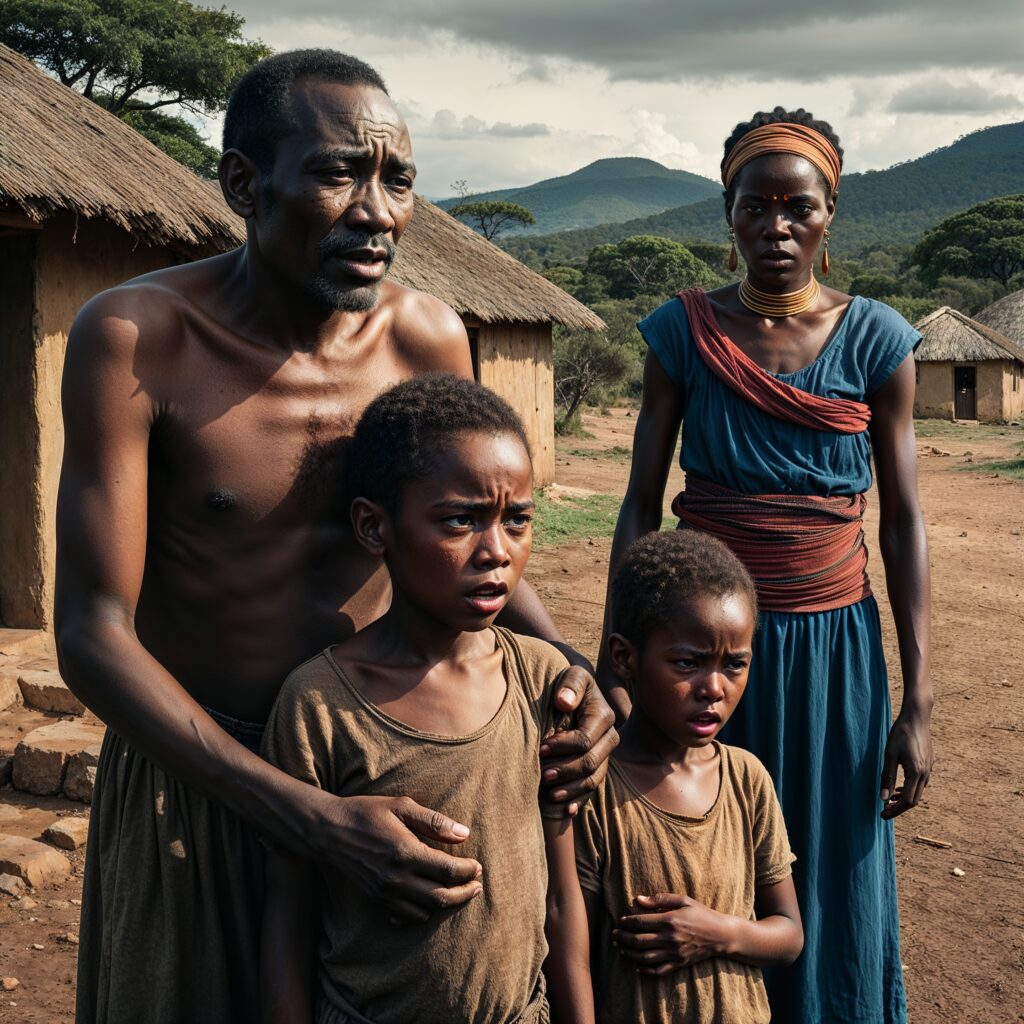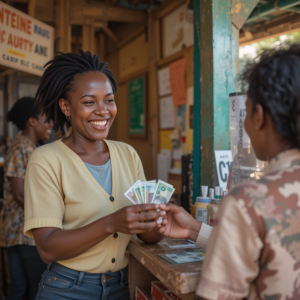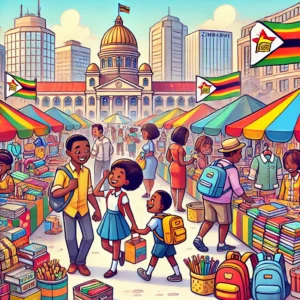The Shadows of Gorongoza: The Tale of a Cruel Stepmother

A distressed family in the wilderness of Gorongoza: Garikayi, the father, stands with a sad and unaware expression, while his children, Kwanele and Ropafadzo, appear emotionally worn out from hardship. Kwanele shows signs of physical labor, with blisters on his hands, while Ropafadzo clings to him, her face filled with fear and sadness. In the background, the strikingly beautiful but cruel stepmother, Tambudzai, watches over them with a cold expression. Traditional African huts and the wild landscape of Gorongoza provide the backdrop, emphasizing their isolation and struggle.
In the sprawling wilderness of Gorongoza, where the sky kissed the mountains and ancient trees stood as silent witnesses to untold stories, lived a man named Garikayi. He was once the village’s most beloved musician, his songs soothing the souls of those who heard them. But beneath the surface of his seemingly perfect life lay a hidden darkness, one that his two children, Kwanele and Ropafadzo, knew all too well.
Garikayi had been a devoted father until tragedy struck. His first wife, the mother of his children, had passed away, leaving behind Kwanele, a 14-year-old boy with dreams bigger than the mountains, and 7-year-old Ropafadzo, whose laughter could light up even the darkest of days. After years of grieving, Garikayi remarried, thinking that his new wife, Tambudzai, would help heal the family’s wounds.
But Tambudzai’s arrival in Gorongoza marked the beginning of a nightmare.
Tambudzai was beautiful—a captivating woman who had ensnared Garikayi with her charm and beauty. Yet behind her perfect smile was a heart colder than the winds that swept through the valleys at night. From the moment she entered their home, her disdain for Kwanele and Ropafadzo was palpable. She saw them as obstacles, remnants of a past she wanted to erase.
At first, Tambudzai’s cruelty was subtle, hidden beneath sweet words and hollow gestures. She whispered poisonous remarks to the children when Garikayi wasn’t around. “Your mother was weak,” she would tell Kwanele, her voice a venomous hiss. “She’s gone, and you’ll be gone too, just like her.” To little Ropafadzo, she sneered, “No one loves you. Not your father. Not anyone. You’re just a burden.”
Soon, her words turned to actions. Tambudzai forced Kwanele to work in the fields from dawn to dusk, his once soft hands becoming calloused and bloody from the relentless labor. If he faltered, even for a moment, she would whip him with a cane, the cruel sound of it slicing through the air as Kwanele cried out in pain. At night, she would lock him outside, forcing him to sleep under the cold stars while the wild animals howled in the distance.
For Ropafadzo, life became an endless stream of torment. Tambudzai took pleasure in degrading the little girl, making her scrub the floors until her hands were raw and blistered. When Tambudzai wasn’t satisfied with Ropafadzo’s work, she would lock her in the storage hut outside, leaving her to cower in the dark, listening to the terrifying sounds of the forest. The rats scurried across the floor, and spiders crawled on her skin, but Ropafadzo was too afraid to cry out.
Garikayi, consumed by his music and his love for Tambudzai, was blind to his children’s suffering. Tambudzai played the role of the doting wife when Garikayi was home, showering him with affection while feeding him lies about how difficult and ungrateful Kwanele and Ropafadzo were. “They don’t respect me,” she would say with a pout. “They refuse to listen. I’m doing everything I can, Garikayi, but they’re impossible.”
And Garikayi, caught up in his own world, believed her.
As the weeks turned into months, Tambudzai’s cruelty escalated to horrifying extremes. When Garikayi traveled for his performances, sometimes gone for weeks, Tambudzai’s reign of terror knew no bounds. She began starving the children, locking away all the food in the house. Kwanele, driven by desperation, would sneak into the forest to forage for berries and roots, but when Tambudzai caught him, her punishments were severe. She tied him to a tree outside, leaving him exposed to the elements for days. The hot sun scorched his skin during the day, and the freezing cold gripped him at night. His once vibrant spirit withered with each passing day.
Ropafadzo’s suffering became even more grotesque. Tambudzai would mock her, cutting off her hair and calling her ugly. “You look like an animal,” she would laugh, throwing the hair on the ground. “Who could ever love such a filthy creature?” At night, Tambudzai forced Ropafadzo to sleep outside on the hard ground with nothing but a thin sheet to cover her. The sounds of hyenas howling in the distance filled the little girl with dread, but she had learned to stay quiet, knowing that screaming would only bring more punishment.
But the worst came one fateful night when Garikayi was away on an extended trip. Tambudzai’s hatred reached its peak. After Kwanele refused to eat the spoiled food she threw at him, and Ropafadzo, in a rare act of courage, tried to defend her brother, Tambudzai’s wrath knew no limits.
That night, after tying Kwanele to the tree once more, Tambudzai dragged Ropafadzo into the house. Her eyes gleamed with malice as she picked up the family’s sacred mbira, the one Garikayi had played for his children every night, a symbol of their mother’s love. Without a word, Tambudzai smashed it to pieces on the ground. Ropafadzo’s heart broke as the once melodic instrument was reduced to splinters. The destruction of the mbira was not just an act of cruelty—it was a deliberate attempt to erase every trace of their mother from their lives.
But Tambudzai wasn’t done.
In front of Ropafadzo’s tear-filled eyes, she took the only thing left from their mother—a small, tattered blanket that Ropafadzo clung to for comfort—and set it on fire. The flames danced wildly, consuming the last remnant of their mother as Ropafadzo screamed in despair. Tambudzai watched, smiling cruelly, as the blanket was reduced to ashes.
“You are nothing,” Tambudzai whispered, her voice dripping with malice. “Just like your mother.”
The next morning, with the ashes of the blanket still smoldering in the air, Kwanele and Ropafadzo knew they had no choice but to escape. Tambudzai’s cruelty had crossed the line from torment to torture, and staying any longer meant certain death. While Tambudzai slept, the two children fled, their feet barely making a sound as they ran through the tall grass of Gorongoza, disappearing into the wilderness.
They didn’t know where they were going, only that they had to get away from the woman who had stolen their joy, their hope, and nearly their lives. As the sun began to rise over the distant mountains, Kwanele and Ropafadzo vanished into the horizon, leaving behind the nightmare that had been their home.
In their hearts, they carried the faint hope that one day, someone would believe them. One day, their father, Garikayi, would see Tambudzai for what she truly was. One day, the shadow of the cruel stepmother would fade, and they could live without fear.
But until then, the echoes of their suffering haunted them, a reminder of the unspeakable cruelty they had endured in the shadows of Gorongoza.
End.





